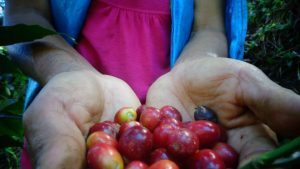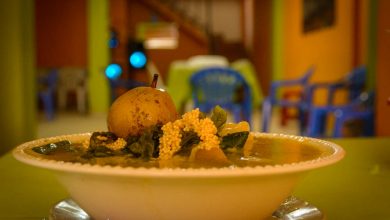Coffee and Social Crisis in Cuzco’s La Convención

Hello. My name is Ernesto Solórzano Vizarreta. I just turned 23. My friends call me Neto. I am neither a historian nor an economist. I am just a young coffee farmer, as well as a barista and a lover of coffee. I am writing to give you my own diagnosis of the problem that I will share with you shortly. I want to witness to our life as coffee growers in Cuzco.
It might be difficult for many people to see the social realities we are experiencing and those that are coming. I just want to mention one of the circumstances we are living in Cuzco’s La Convención province, its main coffee growing area.
La Convención’s capital, Quillabamba is five hours by road from the capital city of our department, Cuzco. Up until a few years ago it agriculture was lively, especially because of the growth of its iconic product, its coffee and its cacao.
These products are still important but not with the maximum splendor of a little while ago. The volume of production is declining. La Convención is experiencing a difficult agricultural crisis, even if we just look at coffee and cacao. These products sustain many farmers.
There are many problems that contribute to the crisis. One is the fungus that has been present for some time, though no one thought it would upend the production of coffee not only in our area but throughout the world. We are talking about the famous fungus many call roya amarilla but whose scientific name is hemilleila baztratix.

The disease attracts the production of coffee and, as a result, affects the economy of all coffee farmers. In the last two years this fungus has attacked 98%, which is almost all, of the coffee trees in the region of Cuzco. Our farmers were not prepared to fight this problem. Some have even quit raising coffee.

The roya fungus is a tremendous problem that our coffee farmers face. But there is another serious problem, our municipalities.
As we know, of all the districts in our country, in La Convención you find ones that benefits most from what is called the canon. This is money that comes to local governments from mineral and petrochemical exploitation in their territories. One of our great non-metallic mineral resources is found in La Convención, natural gas, especially in the district of Echarate. It receives the most money from the canon for its budget of any district in the country. Surprisingly, this has led to scarcity and an agricultural and social crisis.
This juicy budgetary amount from the canon has generated agricultural, social, and cultural scarcity throughout La Convención, and not just in Echarate. Things could have been handled differently but as they are, we have a crisis. The money from the canon created a demand for labor that has meant many coffee producers have abandoned their coffee fields and farms to work for the municipalities.
These last two years, according to our export statistics we see almost no growth in coffee production. It has stayed at previous years levels. This means that in 2015 there will be a huge scarcity of coffee in Peru. Because Peru is one of the countries that lead in the world in the production of organic coffee, demand has grown strongly but production has not. We will not be able to meet the demand.
We have yet to develop a sustainable coffee-culture to meet the problem of roya head on and yet meet market demand. As a result it is likely we will lose market share as well as niches in the global market. This will impact on us into the future.
If we had the coffee in appropriate quality we could expand strongly into the world and claim new niches. But with the roya and other diseases, climate change, the lack of resistant coffee varieties, and a scarcity of labor we will not be able to.
Our older generation of coffee farmers is disappearing and we do not know if the younger generation will bet on agriculture and specifically on coffee. I hear many young people say that farming is their last option, not their first. Many may feel this way but I would say, “no”. Farming is for those with passion and is one of the best investments you can make, especially if you have commitment.
Though I do not want to blame our representative authorities, still they do have the responsibility of helping to find alternatives that might help solve the problems we live in La Convención. Farming is dying here.
Because of the problems farmers face, our society is planting fewer coffee trees since people felt they were not profitable or satisfactory. Some 80% of our young people are migrating to the municipal centers, our towns, where salaries are not bad. We are talking about S/1,500 ($500US) per month. As a result, it makes more economic sense to work in the municipal centers than in our fields.
There is part of the problem. Another part is that our municipal governments lack the passion and commitment to dedicate the monies coming from the canon to help agriculture. We are not transmitting the value of agriculture to our coming generations. I know, I lived this reality and for me the passion is just lacking in our areas and people have lost their vocation. We need to work to rebuild a culture and life of farming.

We must also recognize that a representative business in our industry that has led in the exportation of coffee, COCLA and was a center of cooperatives as well as the image and means of exporting our products, has suffered a tremendous fall. Its problems create great difficulties for all of us and will lead to more crises into the future.
We are living a disastrous reality. Farming is dying. Our youth migrate to work in towns and cities. Roya is attacking our plantings to the fullest. Climate change will not let us work as before, because of the scarcity of water. There are many reasons why our agriculture and our society is diminishing. All of us–farmers, government, buyers, and consumers–need to be aware and seek solutions lest we be complicitous in the destruction of agriculture in La Convención.
I think all of this could be different if we all would find vocation and work with commitment and dedication. We should have love and passion for what we do. With this we could make a different Cuzco with sustainable agriculture and a better country.




